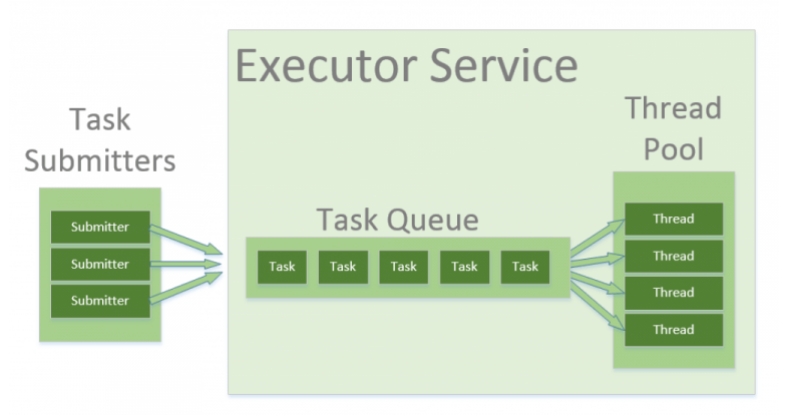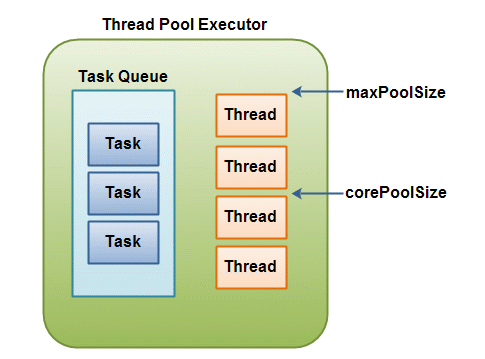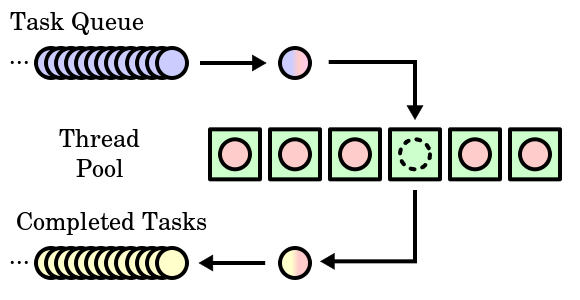 |
Java 1.5 . |
 |
public ThreadPoolExecutor(int corePoolSize, |
Un
ThreadPoolExecutor ajustera
automatiquement la taille du pool (voir getPoolSize()) en
fonction des limites définies par corePoolSize
(voir getCorePoolSize()) et
maximumPoolSize (voir getMaximumPoolSize()).
execute(java.lang.Runnable),
et que moins de corePoolSize
threads sont
en cours d'exécution, un nouveau thread est créé
pour gérer la demande, même si
d'autres threads de travail sont inactifs. setCorePoolSize(int)
and setMaximumPoolSize(int). |
nombre de threads - important. trop de threads - perte de temps pour création des ressources non utilisés. peu de threads - les tâches attendent. pour plus d'information sur nombre des threads: ideal thread pool size |
| import
java.util.concurrent.*; public class ThreadPoolTest { public static void main(String[] args) { int nTasks = 20; // number of tasks to be submitted to pool long n = 30; //Fibonacci number int tpSize = 5; // corePoolSize LinkedBlockingQueue<Runnable> q; ThreadPoolExecutor tpe = new ThreadPoolExecutor( tpSize, tpSize, 50000L, TimeUnit.MILLISECONDS, ( q=new LinkedBlockingQueue<Runnable>( ))); /* public ThreadPoolExecutor(int corePoolSize, int maximumPoolSize, long keepAliveTime, TimeUnit unit, BlockingQueue<Runnable> workQueue) */ System.out.println("Initial number of threads:"+tpe.getActiveCount()); Task[] tasks = new Task[nTasks]; for (int i = 0; i < nTasks; i++) { tasks[i] = new Task(n, "Task " + i,tpe); tpe.execute(tasks[i]); System.out.println("submittint task "+i+ " number of active threads "+tpe.getActiveCount()+ " number of task in the queue "+q.size()); } tpe.shutdown( ); } } --------------------------------------------------------------------------- import java.util.Date; import java.util.concurrent.ThreadPoolExecutor; import java.text.DateFormat; import java.text.SimpleDateFormat; public class Task implements Runnable { long n; String id; ThreadPoolExecutor tpe; private long fib(long n) { if (n == 0) return 0L; if (n == 1) return 1L; return fib(n - 1) + fib(n - 2); } public Task(long n, String id, ThreadPoolExecutor tpe) { this.n = n; this.id = id; this.tpe=tpe; } public void run( ) { Date d = new Date( ); DateFormat df = new SimpleDateFormat("HH:mm:ss:SSS"); long startTime = System.currentTimeMillis( ); d.setTime(startTime); System.out.println("Starting task " + id + " at " + df.format(d)+ "; active threads:" +tpe.getActiveCount()); System.out.println("\tfibonatchi "+ n+":"+ fib(n)); long endTime = System.currentTimeMillis( ); d.setTime(endTime); System.out.println("\tEnding task " + id + " at " + df.format(d) +" after " + (endTime - startTime) + " milliseconds"); } } |
| public
class Cabine { private int free; Cabine(int free){ this.free = free; } synchronized void takeCabine(){ while(free==0){ System.out.println("there is no free cabine, "+Thread.currentThread().getName()+" waiting"); try{ wait(); } catch(InterruptedException e){ System.err.println(e); } } free--; System.out.println("the cabine is taken by "+Thread.currentThread().getName()+", there is "+free+" free cabines"); } synchronized void releaseCabine(){ free++; System.out.println("the cabine is released by "+Thread.currentThread().getName()+", there is "+free+" free cabines"); notifyAll(); } } |
| public
class Basket { private int free; Basket(int free){ this.free = free; } synchronized void takeBasket(){ while(free==0){ System.out.println("there is no free basket, "+Thread.currentThread().getName()+" waiting"); try{ wait(); } catch(InterruptedException e){ System.err.println(e); } } free--; System.out.println("the basket is taken by "+Thread.currentThread().getName()+", there is "+free+" free baskets"); } synchronized void releaseBasket(){ free++; System.out.println("the basket is released by "+Thread.currentThread().getName()+", there is "+free+" free baskets"); notifyAll(); } } |
| public
class Client implements Runnable{ String name; static int n=0; Cabine c; Basket b; Client(Cabine c, Basket b){ name = "Client "+ ++n; this.c=c; this.b = b; try { System.out.println(" creating new client:"+name); Thread.sleep((int)(Math.random()*50)); } catch (InterruptedException e){} } public void run(){ try { System.out.println(this+" going to the swim pool"); Thread.sleep((int)(Math.random()*50)); } catch (InterruptedException e){} System.out.println(this+" try to take basket"); b.takeBasket(); try { System.out.println(this+" going to the cabine"); Thread.sleep((int)(Math.random()*50)); } catch (InterruptedException e){} System.out.println(this+" try to take cabine"); c.takeCabine(); try { System.out.println(this+" changing"); Thread.sleep((int)(Math.random()*600)); } catch (InterruptedException e){} System.out.println(this+" release cabin"); c.releaseCabine(); try { System.out.println(this+" swimimg"); Thread.sleep((int)(Math.random()*2000)); } catch (InterruptedException e){} System.out.println(this+" try to take cabine"); c.takeCabine(); try { System.out.println(this+" changing"); Thread.sleep((int)(Math.random()*600)); } catch (InterruptedException e){} System.out.println(this+" release cabin"); c.releaseCabine(); System.out.println(this+" release basket"); b.releaseBasket(); System.out.println(this+" going home"); } public String toString(){ return name; } } |
| import
java.util.concurrent.*; public class SwimPool { public static void main(String[] args) { int coreThr=7; LinkedBlockingQueue<Runnable> q; ThreadPoolExecutor tpe = new ThreadPoolExecutor( coreThr, coreThr, 5000L, TimeUnit.MILLISECONDS, (q=new LinkedBlockingQueue<Runnable>( ))); Cabine c=new Cabine(2); Basket b = new Basket(3); for(int i = 0; i<15;i++){ tpe.execute(new Client(c,b)); System.out.println("next client,there is "+q.size()+" elements in queue"); try{ Thread.sleep(50); } catch (InterruptedException e){} } tpe.shutdown(); } } |
| import
java.util.concurrent.*; public class Circ { public static void main(String arg[]){ int tpsize = 8; // corePoolSize Pass pass; ThreadPoolExecutor left, right; left = new ThreadPoolExecutor(tpsize,tpsize,20,TimeUnit.MILLISECONDS, new LinkedBlockingQueue<Runnable>( )); right = new ThreadPoolExecutor(tpsize,tpsize,20,TimeUnit.MILLISECONDS, new LinkedBlockingQueue<Runnable>( )); Monitor mt = new Monitor(tpsize-3); Train train = new Train(mt); train.start(); for(int i=0;i<20;i++){ pass = new Pass(mt,Math.random()>0.5?true:false); if (pass.aToB) { left.execute(pass); } else { right.execute(pass); } try { Thread.sleep(100); } catch (InterruptedException e){} } left.shutdown(); right.shutdown(); } } |
| public
class Train extends Thread{ Monitor mt; public Train(Monitor mt){ this.mt=mt; } public void run(){ for(int i=0;i<3;i++){ try{ sleep(1000); } catch(InterruptedException e){} mt.leaveA(); try{ sleep(2000); } catch(InterruptedException e){} mt.arriveB(); try{ sleep(1000); } catch(InterruptedException e){} mt.leaveB(); try{ sleep(2000); } catch(InterruptedException e){} mt.arriveA(); } } } |
| public
class Pass implements Runnable{ boolean aToB; static int num=1; Monitor mt; String name; Pass(Monitor mt,boolean aToB){ name = "pass"+num++ +(aToB?"(A to B)":"(B to A)"); // super.setName(name); this.mt=mt; this.aToB = aToB; } public void run(){ Thread.currentThread().setName(name); if(aToB){ mt.taketA(); mt.leavetB(); } else{ mt.taketB(); mt.leavetA(); } } } |
| public
class Monitor { private boolean onA, onB; private int passAB,passBA, passMax; public Monitor(int passMax ){ onA=true; System.out.println("Train on A"); onB = false; passAB=passBA=0; this.passMax=passMax; } public synchronized void leaveA(){ while(passBA>0) { //train wait for lazy passengers to descend System.out.println("Train wait "+passBA+" to leave it"); try{ wait(); } catch(InterruptedException e){ System.err.println(e); } } onA=false; System.out.println("\t\t\t\tTrain travelling A ->B"); } public synchronized void arriveB(){ System.out.println("\t\t\t\tTrain arrive B"); onB=true; notifyAll(); } public synchronized void leaveB(){ while(passAB>0) { //train wait for lazy passengers to descend System.out.println("Train wait "+passAB+" to leave it"); try{ wait(); } catch(InterruptedException e){ System.err.println(e); } } onB = false; System.out.println("\t\t\t\tTrain travelling B ->A"); } public synchronized void arriveA(){ System.out.println("\t\t\t\tTrain arrive A"); onA=true; notifyAll(); } public synchronized void taketA(){ while(!onA||((passAB+passBA)>=passMax)){ System.out.println("\t\t"+Thread.currentThread().getName()+" waiting train"); try{ wait(); } catch(InterruptedException e){ System.err.println(e); } } System.out.print(Thread.currentThread().getName()+" get the train;"); passAB++; if(passAB+passBA >= passMax) System.out.print(" train is full"); System.out.println("\t"+passAB+" passengers in the train traveling A-> B"); } public synchronized void taketB(){ while(!onB||((passAB+passBA)>=passMax)){ System.out.println("\t\t"+Thread.currentThread().getName()+" waiting train"); try{ wait(); } catch(InterruptedException e){ System.err.println(e); } } System.out.print(Thread.currentThread().getName()+" get the train;"); passBA++; if(passAB+passBA >= passMax) System.out.print(" train is full"); System.out.println("\t"+passBA+" passengers in the train traveling B-> A"); } public synchronized void leavetA(){ while(!onA){ //System.out.println("\t"+Thread.currentThread().getName()+" traveling in the train"); try{ wait(); } catch(InterruptedException e){ System.err.println(e); } } System.out.print(Thread.currentThread().getName()+" leaving the train and going home; "); if(passBA>0)passBA--; System.out.println("\t"+passBA+" passengers B-> A still in the train"); notifyAll(); } public synchronized void leavetB(){ while(!onB){ //System.out.println(Thread.currentThread().getName()+" traveling in the train"); try{ wait(); } catch(InterruptedException e){ System.err.println(e); } } System.out.print(Thread.currentThread().getName()+" leaving the train and going home; "); if(passAB>0)passAB--; System.out.println("\t"+passAB+" passengers A-> B still in the train"); notifyAll(); } } |